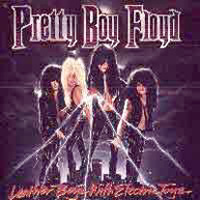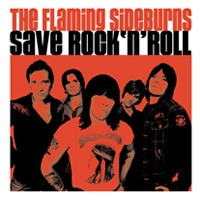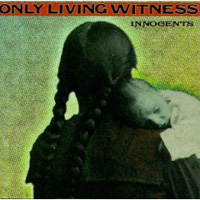 Pretty Boy Floyd
Pretty Boy Floyd
An interview with ex-guitarist Aeriel Stiles
by Michael McCarthy
In 1989, MCA Records released Leather Boyz with Electric Toyz, the debut album of Southern California’s Pretty Boy Floyd. Along with the catchy tunes came a whole lot of attitude, make up, and controversy. If ever there was a love ’em or hate ’em band, it was Pretty Boy Floyd. The fact that nearly ten years have passed and they still haven’t released another album has done little to diminish the band’s knack for getting attention. In fact, the band’s sold out shows last year garnered the biggest crowds “the Hollywood strip” has seen since, well, the so-called grunge era killed so-called heavy metal. Of course, Pretty Boy Floyd’s music was always more anthemic glam pop than anything, so maybe that’s why folks like the cool cats here at Lollipop are still interested.
So, why hasn’t there been a second Pretty Boy Floyd album yet, and will there ever be one? Why did the Leather Boyz album not list songwriting credits, and who wrote the songs anyway? I recently spoke with vocalist Steve “Sex” Summers and ex-guitarist Aeriel Stiles in an attempt to shed some light on these and other matters that have arisen during Pretty Boy Floyd’s decade of decadence. I ended up with a bit of a headache, but, like a good rock concert, I can’t say it wasn’t fun.
When did you first join Pretty Boy Floyd?
In 1986, I was in a band called Doll. The bass player left to form Salty Dog, so Doll dissolved. I was looking to put together a new group still doing the same thing, and I found Steve Summers through an ad in Music Connection magazine. He came down and we hit it off. It took us about a year and a half until we found Vinnie.
How involved in crafting the band’s image were you?
Very involved. And definitely involved in crafting the band’s sound, since I was the one that wrote the material.
Which songs on the Leather Boyz album did you write?
I’d written most of the album was before I’d even met anybody in Pretty Boy Floyd. I wrote “Leather Boyz,” “Wild Angels,” “48 Hours,” and “The Last Kiss,” in ’84, ’85 while I was in Doll. “I Wanna Be With You” was written in ’82, two years before I came to L.A. In ’86, ’87, while Steve and I were trying to find other members, I wrote “Only The Young Understand,” “Rock ‘N’ Roll Outlaws,” and “Your Mama Won’t Know.” This was before we found Vinnie. Many people think I wrote with the other guys in Pretty Boy Floyd, but that isn’t true. I never did. I wrote all the music and lyrics myself.
You obviously left the band before they recorded and released the album. Why?
I’d been playing for a while and had played in a few bands. These guys had never really played in bands before. It just seemed that it was taking way too long to get the music down. I thought it wasn’t gonna come together. I kind of got impatient and left. In hindsight, I wish I hadn’t done that, because it did come together, but at the time I didn’t think it was going to.
Were they not focused? Or just not very good musicians at the time?
Maybe they were still struggling to become proficient on their instruments. Eight months down the line, it had come together. I didn’t realize the drummer, Kari, was kind of involved in drugs. Once he cleaned that up, his playing was really together.
 When did you find out they were continuing to use your songs without you? When the album came out?
When did you find out they were continuing to use your songs without you? When the album came out?
Actually, it was before that. I went to their first show at The Roxy. I was surprised when I was outside and was hearing – it might’ve been “Leather Boyz.” Then I was really surprised when I got in and every song they played was my song. I had no idea they were doing that.
Did you talk to them after the show?
I just dropped a line, “Hey, if anything ever happens, just make sure I get the songwriting credit.” And I got the, “Yeah, sure, sure.” After their second show, Vinnie and Steve came to my house and I talked to them about rejoining. Said, “Hey, I made a mistake, what do you think about me rejoining the band? Since it is my sound you guys are using.” They said they’d think it over. Vinnie has told me since then that he wanted me to come back. It was Steve that was still kind of mad because I’d left. So, they didn’t ask me to rejoin. After the sixth or seventh show, I heard about MCA approaching the band. I contacted MCA and informed them that I wrote all those songs. They asked me to send them a tape. I followed up with a call to Bret Hartman, their A&M manager, and he said, yes, he’d received the tape and suggested I talk to an attorney. I did get an attorney and he contacted the label. They dragged their heels about trying to resolve it. At that point, there was nothing we could do. We just had to sit back and see what was gonna happen. They went ahead and had the band record the album and put the album out. I guess to cover themselves, they put no songwriting credits on the album.
Not even for “Toast of the Town,” which was a Mötley Crüe song.
Yes, that’s right. From there, as soon as it was released, we just went ahead and took further legal action against the band and MCA.
What happened then?
The band actually ran out of money to defend themselves and finally decided they wanted to make an attempt to settle out of court. So, we negotiated a settlement. For my part, I wanted credit for what I had done. And, of course, it’s in my best interest if the record would succeed. So I was willing to try to settle it myself and not have to go through the trial, which would’ve really hurt the success of the album. That’s basically what happened. We were able to settle and a few short months later the band decided to fire Kristy and asked me to rejoin.
After all of that, what persuaded you to rejoin?
I think a lot of people wonder how somebody could try to steal your songs and you could rejoin the band. One thing is Vinnie Chas was a good friend of mine and I knew he wasn’t really involved. I felt like at least there was one person in this band I could trust. At the same time, we needed each other because I needed a vehicle for my songwriting and they needed a songwriter.
How extensive was your second run with them?
I rejoined the band in January of ’91 and stayed with the band until about spring of ’94 when it finally broke up.
What were the vibes like between you guys during those years? We had to just drop it and move on. We all wanted the same thing. We all wanted to be successful. There was no point in going over something that was now in the past. We had other things to worry about, like the turmoil that was starting to happen at MCA. The mass firings there, which included our publicist and the A&M manager who signed us. Things weren’t looking good as far as the second album was concerned. The new person had worked with adult contemporary artists and didn’t understand Pretty Boy Floyd. We were with the same management company as Warrant and they wanted to get us off the label. We were able to dissolve our agreement and were looking for another deal. We went through a period of doing a lot of shows that went very well, refining our image, and trying to build on what we were doing live. I began to work with songwriters from different publishing companies and well-known groups, trying to expand the songwriting. During that time, there were about 35 Pretty Boy Floyd demos recorded.
How did that process go? Did they learn the songs after you wrote them so you could cut the demos?
A lot of times, to save money, we would use drum machines. Either I or the other songwriter would program the drum machine. Usually it was just me playing on the tape and Steve would come in and sing the vocal. Myself or the other songwriter may have sung the rough track of the vocal and Steve would learn it and re-sing it.
Why did Pretty Boy Floyd finally call it quits in 1994?
One of the biggest reasons was management. The band’s original manager is involved as a fifth member of the band. Vinnie and I just felt we didn’t have a choice in our own careers, other people were making decisions for us. There were secrets, lies, and funny things going on with the money. To this day, Vinnie hasn’t been paid one cent of his share of the publishing money from the Leather Boyz album. On top of that, we had Steve and Kari never coming to rehearsal. There were days when Vinnie and I would just show up and sit there, and the other guys would never show up. After too many times of this happening, we decided this wasn’t much fun anymore.
Was it a unanimous decision for the group to split up at that point, or did you and Vinnie leave first and then they dissolved?
Vinnie and I decided to leave. At that point, it took Steve until only sometime last year to finally put Pretty Boy Floyd back together.
As the songwriter, what did you think of the Leather Boyz album?
As far as their performances go, it was pretty much note-to-note copies of my original demos. A few things had been changed. I liked some of the changes, and some of the changes I didn’t like. What disappointed me most had nothing to do with the band, it was the quality of the recording. I listened to the Bang Tango album, which was produced by the same producer, Howard Benson, and the Bang Tango album seemed to have so much more power to the sound. On the Pretty Boy Floyd album, the sonic quality just wasn’t there. The bass, guitar, and drums had no crunch.
What’s your overall perspective on Pretty Boy Floyd getting back together today?
They’re happy doing what they’re doing, and I’m certainly happy doing what I’m doing. Unfortunately, a couple days ago I was informed of another incident of them taking a song of mine and putting their name on it. Trying to steal a song from me again. So, my relationship with Pretty Boy Floyd is now officially over. I’ve done everything I could to help them, in and out of the band, and all I’ve gotten in return is backstabbing. So, I’m not too interested in what happens to their career anymore.
What exactly do you mean by stealing a song from you?
We had an agreement last year. They wanted to use some of my material, so we had a written agreement for them to do so for demo recordings. Anything that was going to be released for sale, they would have to obtain a mechanical license, which is standard in the industry. Then I found out they put a song on a compilation record without my knowledge. Steve Summers put his name on as the songwriter when it was in fact written by myself and Todd Meagher of Warner-Chappell Publishing. I don’t know why they feel the need to take credit for someone else’s work, but apparently that’s how they like to do things.
What’s the name of this compilation record?
It’s called The Pink and the Black. It’s a glam and Goth compilation that was put out on Delinquent Records.
How did you find out about it?
Actually, on the Internet. Then I contacted Delinquent Records and learned more of the details. Understandably, they’re very upset that they were deceived by the band.
So it’s safe to say that this is going to be an ongoing issue?
Yes. There are lawyers at work to resolve this. I should be settling things quite soon with Delinquent, who plan to take strong legal action against Pretty Boy Floyd, as well publicizing their illegal actions.
Vinnie, the one member from the Leather Boyz album who’s not in the band’s current incarnation, was in your band Rattlin’ Bones, right?
Yeah. That was about two or three years ago.
Are you and he still in touch? Why’d you part ways musically?
Rattlin’ Bones fell apart on us. The vocalist decided to leave California and the drummer wasn’t working out. After Pretty Boy Floyd breaking up and this happening, Vinnie decided to take a break from music. I didn’t, so I ended up putting Stratosphere together. But I talk to Vinnie all the time and right now, he’s trying to put a group together.
How did you meet the guys in Stratosphere?
Stratosphere came directly out of Rattlin’ Bones. It’s more or less the same material, but I decided to go in a different direction as far as vocalists go. I was playing an event on Memorial Day, and the guy that was DJing happened to be Jeff Alpin, somebody I went to high school with who I hadn’t seen in years. Between the breaks the band was taking, he was doing country Karaoke. The guy’s voice was so right on, I offered to record a demo for him. We did five songs in one day. The more I listened to it, the more I could hear him on top of my songs. I approached him, he gave it a shot, and it came out great. He decided, luckily for me, to abandon country. From there, Stratosphere was born.
How did you find the others guys?
We found them through ads in Music Connection magazine. The drummer, Jay [Rezendes], he’s originally from the East Coast. Like most musicians, he came out to L.A. when the scene was the place to be. The bass player, John [Binkley], had been out here during the glam time and played in a band called Blush, which was a Van Halen-sounding group. The great thing about Stratosphere is that everybody is focused on the same goal. Everybody is really into doing ’70s-influenced hard rock.
How would you compare it to Pretty Boy Floyd, for those who might be wondering?
I could say there is no comparison to be made at all. The only thing is maybe the way I write songs. I never write a song without making sure I’ve got a good vocal hook.
With Pretty Boy Floyd, the lyrics were about saying fuck the world, partying and having a good time. With Stratosphere, it’s almost the antithesis in that the songs are kind of saying there’s shit going on, so stop partying and wake up! Is that an accurate observation?
I’m really glad you asked that question because that was another thing I was really tiring of in Pretty Boy Floyd. We were only going to write about these type of subjects and every song had to be an anthem. At some point, you run a risk of being a parody of yourself because you can only talk about partying all night for so long ’til the inspiration is gone. With Stratosphere, my desire was to do almost, yes, the opposite, as far as song structure, pop formula, trying to write a hit single. I really wanted to write music that was more interesting, more progressive. And when it came to subject matter, I wanted to write lyrics that had a lot more thought and something to say.
Although it’s more psychedelic than glam, I’d say the image of Stratosphere is as out there as Pretty Boy Floyd. That said, do you find Stratosphere being embraced by the Pretty Boy Floyd fans?
I haven’t seen any evidence of that yet. Certainly some people that were Pretty Boy Floyd fans have responded well to the CD. Time will tell. Stratosphere concentrates on the music first, but definitely has an image. In the ’80s, there came to be a certain look that defined glam, but if you look back to when glam was born in the ’70s, what we’re doing now isn’t much different. Glam, to me, is anything that’s either flashy or makes an image statement.
You have a self-released CD. What are you doing with it? Selling it at your shows? Shopping it to labels?
All of that. Delinquent Records is distributing the CD for us, and we’re looking for sources to increase our distribution. And we’re selling it at our website [www.wavenet.com/~hippyrok] and our shows.
You also write fiction. Did songwriting lead you to this?
Absolutely. I’ve always been a creative person beyond music. I used to make animation with my movie camera. I used to write short stories in school. Three or four years ago, I decided to get a little more serious about writing fiction because I enjoy reading it so much. I ended up taking some classes. Not only did my fiction get better, my songwriting got better, too.
All of your stories that I’ve read have been horror. Have you written outside of the horror genre?
I like thrillers and suspense just as well as horror. I just started with horror because I was more comfortable with it. I’ve written some suspense stories and have a suspense novel I’m going to finish one day. The major theme is our privacy and how we’re losing more of it everyday. This story takes that to the extreme. How the technology we so readily accept can be used against us.
Who are your favorite authors?
As far as horror goes, the man for me is Dean Koontz. Then Stephen King. Another writer who doesn’t put out many books, but when he does they’re fantastic, is Richard Christian Matheson, son of the famous horror writer Richard Matheson. As far as suspense novelists, George Dawes Green, who wrote The Juror, Mary Higgins Clarke, John D. MacDonald.
How seriously do you take writing fiction? Would you be happy with a successful career as a novelist, as opposed to a successful career as a musician?
I would be absolutely just as happy. As a person in life, I just have to be creating something to be happy. The medium isn’t as important as the art itself.



